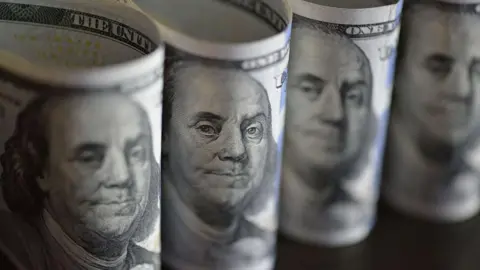### Why Should You Worry About the Decline of the US Dollar?
The US dollar has been experiencing notable decreases in value over recent months, sparking concerns and discussions among economists, investors, and ordinary citizens alike. Understanding the implications of such a decline is crucial, not just for investors but for the general public. Currency fluctuations can have far-reaching effects, and the current situation requires attention.
### The Background of the Dollar’s Decline
After Donald Trump’s victory in the 2024 presidential election, the dollar initially experienced a rise. This uptick was attributed to a combination of strong economic indicators and speculation about Trump’s trade policies, which many believed would stimulate growth. Investors were particularly optimistic that the tariffs Trump proposed would lead to inflation, compelling the Federal Reserve to raise interest rates or at least halt any cuts, thereby increasing the dollar’s attractiveness as an investment.
However, as the specifics of Trump’s tariff policies began to unfold—with many being postponed or altered—concern over their potential impact on US economic growth grew. This uncertainty, alongside Trump’s critical remarks directed at Jerome Powell, the chair of the Federal Reserve, has contributed to the weakening of the dollar.
### Current Currency Trends
The dollar’s value against a basket of other major currencies has tumbled, reaching a three-year low in recent weeks. Factors influencing currency values include inflation expectations and variables in central bank policies. The dollar index, which measures the strength of the dollar relative to other currencies, has fallen dramatically, indicating a loss of confidence.
Jane Foley, head of foreign exchange strategy at Rabobank, highlighted that the dollar is typically viewed as a safe haven asset. Therefore, its significant decline, combined with sell-offs in US government bonds, is unusual and alarming. If the prevailing trend continues, it could signal a more profound shift away from the dollar as a major reserve currency.
### Implications for Everyday Americans
For the average American, the first noticeable effect of a weaker dollar is likely to come when traveling abroad, as their purchasing power diminishes—meaning that a dollar will buy less in foreign countries. Conversely, foreign tourists visiting the US will benefit, finding their currencies can buy more goods and services.
However, the consequences of a declining dollar stretch much further. As the primary reserve currency held by central banks globally, the dollar plays a vital role in international trade and transactions. Approximately 50% of global trade invoices are conducted in US dollars. The weakened dollar makes US exports cheaper for foreign buyers while increasing the cost of imports, potentially leading to higher prices domestically.
### Future Expectations and Concerns
If the decline of the dollar persists, it raises broader questions about America’s economic stature. Traditionally, a strong dollar has been associated with US political and economic might, and the very notion of the dollar losing its reserve currency status seems unfathomable. While experts like Foley affirm that the dollar is unlikely to relinquish its position anytime soon, there are signs that suggest the need for vigilance.
Potential political dynamics, illustrated by Trump’s ongoing criticism of Powell, may prompt concerns regarding the Federal Reserve’s independence. Such political pressures can undermine public and investor confidence, leading to instability in markets. The credibility of central banks is paramount for maintaining long-term price stability, and any perception that they are subject to fluctuating political agendas could lead to serious economic repercussions.
### Conclusion
In summary, the recent decline of the US dollar is not just an economic issue for financial experts but a matter that affects everyone. The implications of a weakening dollar—ranging from purchasing power abroad to international trade dynamics—are significant. The interplay between economic data, political discourse, and public confidence in financial institutions will likely dictate the future outlook of the dollar. As citizens, staying informed on these developments is essential, as they can resonate through various aspects of everyday life, from personal finances to the broader economy.



